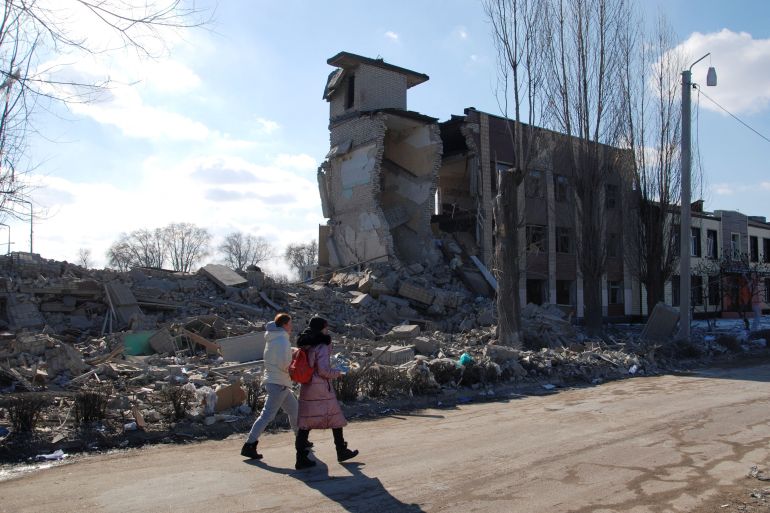UN court orders Russia to halt invasion of Ukraine
The International Court of Justice orders Russia to halt its invasion and says it is ‘profoundly concerned’ by Moscow’s use of force in Ukraine.

The International Court of Justice (ICJ) has ordered Russia to cease military actions in Ukraine immediately, saying it is “profoundly concerned” by Moscow’s use of force.
“The Russian Federation shall immediately suspend the military operations that it commenced on Feb 24, 2022 on the territory of Ukraine,” judges at the United Nations’ highest court said in a 13-2 decision on Wednesday.
Keep reading
list of 3 items‘Close the sky over Ukraine’: Zelenskyy pleads to US Congress
Putin says Russia will achieve Ukraine goals, decries sanctions
The judges added that Russia must also ensure that other forces under its control or supported by Moscow should not continue the military operation.
Although the court’s rulings are binding, it has no direct means of enforcing them and in rare cases countries have ignored them in the past.
Countries that refuse to abide by court orders can be referred to the UN Security Council, where Russia holds veto power.
Still, Ukrainian President Volodymyr Zelenskyy hailed it as a major victory.
“Ukraine gained a complete victory in its case against Russia at the International Court of Justice,” he wrote on Twitter. “The ICJ ordered to immediately stop the invasion. The order is binding under international law. Russia must comply immediately. Ignoring the order will isolate Russia even further.”
Ukraine gained a complete victory in its case against Russia at the International Court of Justice. The ICJ ordered to immediately stop the invasion. The order is binding under international law. Russia must comply immediately. Ignoring the order will isolate Russia even further
— Володимир Зеленський (@ZelenskyyUa) March 16, 2022
Ukraine filed its case shortly after Russia’s invasion began on February 24, saying that Russia’s apparent justification – that it was acting to prevent a genocide in eastern Ukraine – was unfounded.
At the hearings, Ukraine said there is no threat of genocide in eastern Ukraine, and the United Nations’ 1948 Genocide Convention, which both countries have signed, does not allow an invasion to prevent one.
Russian President Vladimir Putin has described the invasion as a “special military action” needed “to protect people who have been subjected to bullying and genocide” – meaning those whose first or only language is Russian – in eastern Ukraine.
Russia said it skipped ICJ hearings on March 7 “in light of the apparent absurdity of the lawsuit”.
However, Moscow did file a written document with the court saying the ICJ should not impose any measures.
Russia had argued that Putin’s use of the word “genocide” does not automatically imply that it is basing its actions on the Genocide Convention. Without a dispute over the interpretation of the treaty, the court has no jurisdiction, Russia argued.
Presiding Judge Joan Donoghue said the court had enough information that the two countries do disagree about the interpretation of the Genocide Convention to make the preliminary decision. Actual jurisdiction would only be decided later.
In an urgent situation such as the conflict in Ukraine, the court can order emergency measures in a matter of days, even before it decides on whether it has jurisdiction in a case. That usually takes many months, while decisions on the actual merits of a case can take years.
In the days since the March 7 hearing, Russia has intensified its military strikes on towns and cities across Ukraine, hitting civilian infrastructure across the country – including a deadly strike on a maternity hospital in Mariupol. More than three million refugees have fled Ukraine during the war, according to the UN.
Separately, the chief prosecutor of the International Criminal Court (ICC), Karim Khan, met with the Zelenskyy in a surprise meeting earlier on Wednesday. The pair discussed the court’s ongoing investigation into possible war crimes in the country. While the ICJ can hold states responsible, the ICC could prosecute individuals.